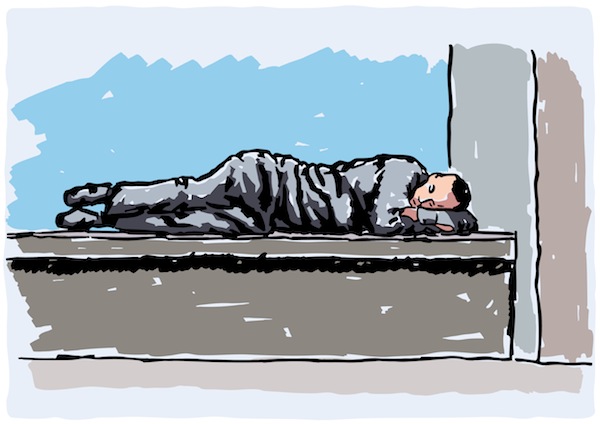On 1st September 2012, section 144 of the Legal Aid, Sentencing and Punishment of Offenders Act (LASPO) was passed into law, making squatting in a residential building in England and Wales a criminal offence.
Punishable by a maximum prison term of up to six months, a £5,000 fine, or both, then Housing Minister Grant Shapps said of the new law: ‘We’re tipping the scales of justice back in favour of the homeowner and making the law crystal clear: entering a property with the intention of squatting will be a criminal offence.’
Six months on, Squatters’ Action for Secure Homes (SQUASH) have published a report (The Case Against Section 144) suggesting the ‘major concerns with criminalisation that arose during the government’s consultation process have manifested, with homeless and vulnerable people disproportionately affected.’
Based on Freedom of Information (FOI) requests made to the police, media reports and figures from other squatters’ groups, SQUASH’s research has found that none of the arrests made under s144 so far have involved squatters displacing someone from their home. Au contraire, 108 people have been displaced after incidents involving the police attending properties to investigate offences under s144, adding to the rapidly rising number of homeless people in the UK.
In the midst of one of the worst housing crises this country has ever witnessed, the deleterious effects of criminalising squatting are palpable. 21-year-old Alex Haigh was the first person to be prosecuted under s144. He had come to London to pursue an internship as a bricklayer and resorted to squatting after finding himself homeless and looking for a safe place to live. Alex was arrested for living in an empty housing association flat in Pimlico, and was sentenced to 12 weeks in jail. He had no previous convictions. In January, Michael Minorczyk – homeless, unemployed and with drinking problems – was taking shelter for the night in an empty house when he was arrested and sent to prison for 15 weeks under s144. Last week, a homeless man in Aylesford, Kent, froze to death on the doorstep of an empty bungalow having previously had trouble with the police when he tried to break into the abandoned building for shelter. The 35-year-old man apparently took the decision to stay outside for the night, risking his safety to stay on the right side of the law.
Whilst the tabloid media and Tory MPs are quick to characterise squatters as ‘aggressive trespassers’ who ‘take hostage’ of suburban homes while their law-abiding owners are out striving at work – see HERE and HERE – SQUASH’s report shows that this is a populist myth. Squatting is most often a last resort for homeless people, the alternative being rough sleeping, and in all three examples mentioned above the properties lay empty and unoccupied – as do almost one million buildings across the UK right now, 290,000 of which are long-term empty.
As Professor Danny Dorling, of Sheffield University, puts it:
‘Squatting is what people do when they get desperate, it is not criminal behaviour. Squatting rises when inequalities increase and housing is not treated as a necessity.’
Just why parliament felt the need to change the law on squatting to ‘protect the homeowner’, when the existing law adequately did so, has yet to be established. In September 2011 – before the Bill became law – 160 legal professionals attempted to educate the government in housing law by writing an open letter to the Guardian, explaining to the likes of the vociferous anti-squatting campaigner Mike Weatherley MP that it was, in fact, already a crime to ‘displace an occupier’ (i.e. squat a home to the exclusion of the householder), under the Criminal Law Act 1977. The same letter accused ministers of ‘obscuring’ the law and of ‘sensational misrepresentation’ in debates on the subject.
Despite this – as well as opposition from the Criminal Bar Association, the Law Society and even the Metropolitan police (PDF) – the inviolable interests of private property trumped the needs of the vulnerable and the law was passed, circumventing the normal process in the Commons as, according to SQUASH campaigner Joseph Blake, it was whisked through the House of Lords ‘in the dark hours of the night, deploying authoritarian and discretionary power’.
Nut crackers
Criminal barrister Jon Mack of Blackfriars Chambers argues that rather than taking steps to encourage police to enforce the existing law in relation to residential squatters, parliament – in legislating to give the police a power of entry to premises to effect an arrest – had ‘used a sledgehammer to crack a nut, when the metaphorical nut-crackers were within easy reach of the Home Office.’
With such a clandestine passage of an unnecessary Bill into law, largely ignoring its own consultation on the subject, it should come as no surprise to the government that public reaction to the criminalisation of squatting has, at times, been rather vicious (see HERE). Presenting homeless people with a choice between going to prison for seeking shelter in empty buildings or freezing to death on a doorstep to avoid prosecution is redolent of Dickensian Britain and demands an uproarious reaction from society.
The criminalisation of squatting represents yet another example of the Coalition protecting the rich at the expense of the welfare of the poor and the vulnerable. And with further cuts to welfare provision coming in on 1st April, the melancholy truth is that things will only get worse.








A detailed critique of the Court of Appeal judgment in the case of Oliver Campbell